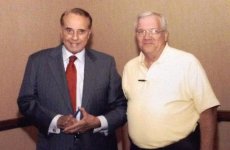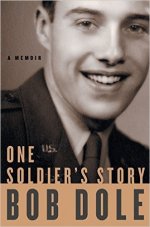Look it up, I don't beleive he was ever Govenor of Kansas
Dole ran for office for the first time in 1950 and was elected to the
Kansas House of Representatives, serving a two-year term.
Also in 1952, Dole became the County Attorney of
Russell County, serving in that position for eight years. In 1960, Dole was elected to the
United States House of Representatives from Kansas' 6th Congressional District, located in central Kansas. In 1962, his district was merged with the 3rd District in western Kansas to form the
1st Congressional District, a huge 60-county district that soon became known as the "Big First." Dole was re-elected that year and twice thereafter without serious difficulty.
[h=3]U.S. Senate[/h] In 1968, Dole defeated
Kansas Governor William H. Avery for the Republican nomination for the
United States Senate to succeed retiring Senator
Frank Carlson, subsequently being elected. Dole was re-elected in 1974, 1980, 1986, and 1992, before resigning on June 12, 1996, to focus on his
Presidential campaign. Dole faced only one truly enthusiastic and well-financed challenger, Congressman
Bill Roy in 1974. Much of Roy's popularity was in response to the fallout from
Watergate. Dole would win re-election in 1974 by only a few thousand votes, having in the end graphically painted Roy as pro-abortion. While in the Senate, Dole served as chairman of the
Republican National Committee from 1971 until 1973, the ranking Republican on the
Agriculture Committee from 1975 to 1978, and the ranking Republican on the
Finance Committee from 1979 to 1980.
When the Republicans took control of the Senate after the 1980 elections, Dole became chairman of the
Finance Committee in 1981, serving until 1985. From 1985, when
Howard Baker of
Tennessee retired, until his resignation from the Senate, Dole was the leader of the Senate Republicans, serving as
Majority Leader from 1985 until 1987 and again from 1995 to 1996. Dole served as
Minority Leader from 1987 to 1995. Following the advice of conservative
William Kristol, Dole flatly rejected the health care plan of
Bill Clinton, remarking, "There is no crisis in health care."
Dole had a moderate voting record and was widely considered to be one of the few Kansas Republicans who could bridge the gap between the moderate and conservative wings of the Kansas Republican Party. As a Congressman in the early 1960s, Dole supported the major civil rights bills, which appealed to moderates. When Johnson proposed the
Great Society in 1964–65, Dole voted against some
War on Poverty measures like public-housing subsidies and
Medicare, thus appealing to conservatives. Dole's first speech in the Senate in 1969 was a plea for federal aid for the handicapped. Later, as a member of the
Senate Select Committee on Nutrition and Human Needs, Dole joined liberal Senator
George McGovern to lower eligibility requirements for federal food stamps, a liberal goal that was supported by Kansas farmers.
Dole's hawkishness on the
Vietnam War and on crime issues kept him in good standing with the right wing. When they heard Nixon might make Dole chairman of the Republican National Committee, half the Republican Senators protested, especially moderates who feared Dole would direct party assets to conservatives. They were wrong, as Dole in fact offered something to all Republican factions.[SUP]
[16]
[/SUP]




